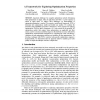Free Online Productivity Tools
i2Speak
i2Symbol
i2OCR
iTex2Img
iWeb2Print
iWeb2Shot
i2Type
iPdf2Split
iPdf2Merge
i2Bopomofo
i2Arabic
i2Style
i2Image
i2PDF
iLatex2Rtf
Sci2ools
204
click to vote
CC
2009
Springer
2009
Springer
A Framework for Exploring Optimization Properties
Important challenges for compiler optimization include determining what optimizations to apply, where to apply them and what is a good sequence in which to apply them. To address these challenges, an understanding of optimization properties is needed. We present a model-based framework, FOP, to determine how optimizations enable and disable one another. We combine the interaction and profitability properties to determine a "best" sequence for applying optimizations. FOP has three components: (1) a code model for the program, (2) optimization models that capture when optimizations are applicable and their actions, and (3) a resource model that expresses the hardware resources affected by optimizations. FOP determines interactions by comparing the create- and destroyconditions of each optimization with the post conditions of other optimizations. We develop a technique with FOP to construct code-specific optimization sequences. Experimentally, we demonstrate that our approach ac...
CC 2009 | Code-specific Optimization Sequences | FOP Determines Interactions | Optimization Properties | Programming Languages |
Related Content
| Added | 22 Nov 2009 |
| Updated | 22 Nov 2009 |
| Type | Conference |
| Year | 2009 |
| Where | CC |
| Authors | Min Zhao, Bruce R. Childers, Mary Lou Soffa |
Comments (0)

